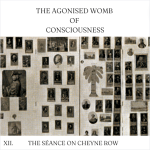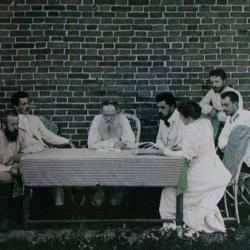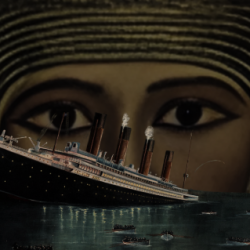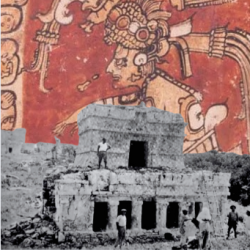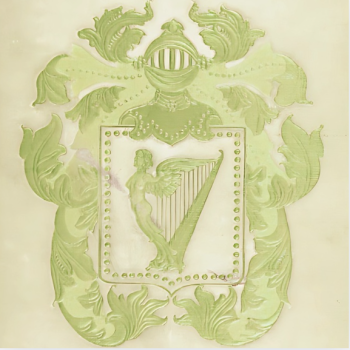RUSSIA’S LEGENDARY LORE
XIV.
⸻
“I have never seen anything more beautiful and original than Moscow in all of Europe,” said Charley, admiringly.
He and Verochka were strolling through the streets of Moscow with the Zhelikhovskaya sisters, Nadezhda and Elena. “Kreml’ ochen’ krasivyy,” said Charley, purchasing another souvenir print of the city. In the weeks since his arrival, it became his habit to wander endlessly around the Kremlin, studying the history of all the towers, temples, palaces, and monuments.
“I’ve never seen such a linguist before in my life,” Elena whispered to Verochka.[1]
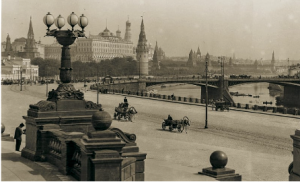
Moscow.
The Slavic Vedas of Stefan Verković’s Illyrian movement were discussed in the more curious social circles of Moscow.[2] The topic, naturally, was of interest to a Theosophical philologist such as Charley. On the walk back to the Zhelihovsky apartments, Charley mused on Russian spirituality
“Folklore is the history of people told by themselves,” said Charley. “It would give us a far fuller, truer, and more faithful record of that people’s life than any toilsome chronicler, or ponderer over dusty tomes could hope to write. In that legendary record, fresh from the people’s life and the people’s heart, their sorrow would be sorrowful, their joy would burst into song, and the mysteries of their life would remain mysterious.
“Had we such a legendary cycle, then not Greece and India alone, but every people would have an Iliad and a Veda, a record of valor and heroism, of wisdom and wit. In its youth, every nation must have had its legendary history, its grand national Epic, sung and acted by the heroes and bards of generations, and providing the social and moral religion, the poetry, drama and romance, and the soul’s daily bread for the people that possessed it.
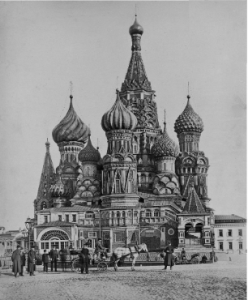
St. Basil’s Cathedral.
“In the ‘dark ages,’ our troubadours and bards, our Arthurian and Ossianic cycles, Nibelungen Lied and Eddas were yet with us—and where the ‘dark ages’ still linger among the ‘barbarous,’ ‘backward,’ and ‘unenlightened’ cultures, we may yet find people whose traditional Epos is well-nigh complete, still feeding and interpreting the moral life of the people and linking today with the mythical past. Among the nomads of Asia, the mountaineers of the Caucasus, the bards of remote Russian villages, it seems there still remains legends so rich, and so copious, that the history of Empires might be learned from them, were all written histories to be destroyed. In Russia the legendary Epos still lives—it is being added to even today—it has recorded the spirit and life of the middle ages, and it stretches back to a pre-historic past when the happy gods still walked with men. Bright and joyful were the gods of old Russia, full of friendly kindness for the worshippers, like the deities of the old Vedic hymns.
“When Christianity was brought to Russia, it soon took root in the realms of the old Slavonic gods, not as a supplanter, but as an ally. The masses accepted the teaching of the Church, and the ethics of Christ took a place in the heart of the people side by side with the old zoomorphic gods and the loving communion with nature. No rites for the dead or mention of death are allowed by the Orthodox Church on Easter Day, but the old traditions linger in the heart of the people, and though they relinquished their wish to consecrate the same day to the resurrection and to Kupalo, the old god of Spring, still the week after Easter is universally given up to the dead, in the spirit and rites of the old religion. Tears and lamentations have no part in these ceremonies. They eat drink and rejoice, and lay offerings from the banquets on the graves of their dead. Eggs dyed red are buried by the children in the tombs—not in the graveyards only, but in the cromlechs and tumuli of old heathendom.”[3]

Moscow.
When they returned to the apartments, they found that Masha had prepared tea for Charley and the sisters. Maria “Masha” Timofeevna was Vera Petrovna’s former serf peasant. She came to the family as a very young girl but became something of a second mother to the Yakhontov brothers (half-brothers to the Zhelihovsky sisters.) When Alexander II emancipated the serfs in 1861, Masha remained a close friend of the family, and stayed with them as a loyal nanny. Vera Petrovna sent money to Masha’s family in Pskov, but Masha herself refused extra payment. On occasion, Vera Petrovna’s relatives insisted that Masha accept a few rubles. Masha would thank them but would arrange a feast for the children of Vera Petrovna on the same day—buying toys, sweets, and fruits. It was rumored that one of the cooks in the palace of Prince Mikhail Nikolaevich proposed marriage to her, but she declined, for she never thought about herself, and refused to abandon the family of Vera Petrovna. When Vera Petrovna fell on hard times, and could not keep servants, the ever-devoted Masha “turned into a cook, a maid, and a laundress.”[4]
They were expecting a visit from their cousin, Sergei Witte, later that evening. As the hour of his arrival drew near, they told Charley stories of their family and childhood.
“When our mother lived in Odessa,” said Nadezhda, “she collaborated with the local press, and sent her stories to children’s magazines in Moscow and Petersburg. She used to sit at her desk all day and would only get up in the evening to stretch her back, go for a walk, or join the gossip-circle of her old lady friends.
“In addition to her aunts, Ekaterina Andreevna Witte, and the elderly Nadezhda Andreevna Fadeeva, mom had a whole ‘galaxy’ of old women—repositories of memories—who had the most compelling spiritual qualities. They had weekly card sessions, but mom did not like to play cards, and usually read something to them, or listened to their memories of antiquity.”
“They gave her a lot of topics for stories and stories, which she later used,” said Elena.
“All these old women had pensions, and rented estates near Odessa,” Nadezhda continued, “The food at these ‘old ladies’ meetings’ was abundant and tasty. Valya, who invariably came for our mother, so she would not walk the streets alone, feasted on fruits and sweets with a great appetite.”[5]
Witte eventually arrived, and introductions were made. Born in Tiflis, in 1849, Witte was just under forty-years of age. He studied at the Tiflis College, and showed great promise mathematics, so, he enrolled in Odessa University in 1866, with the hopes of being a professor in that field. He earned the large gold medal upon graduation, but his dream of professorship was never realized. Four years later, in his twenty-first year, he tried his hand at journalism, but his family finally persuaded him “to enter practical life.” Witte accepted the post of Inspector in the Society of Navigation and Commerce, which owned the Southwestern Railroad of Russia (connecting Warsaw and Kiev with the port of Odessa.) The districts tapped by this railroad were among the richest agricultural land in Russia (great wheat regions, and the zone of the sugar-beet in Poland.) Witte began on a salary of $50 a month and committed himself to thoroughly mastering the whole business of railroad traffic.[6] He accompanied Tsar Alexander III to Yalta, earlier that summer, when the Emperor reviewed the maneuvering of troops. It was a topic that was explored through the course of conversation.
“As a rule,” said Witte, “the schedule for the Imperial trains was worked out by the Minister of Ways of Communication without consulting the directors of the local railways. According to the schedule, which I received in due time, the Imperial train was to make the distance between the stations Rovno and Fastovo with a speed which was safe only for a light passenger train. As a matter of fact, several hours before the arrival of the train, I was informed by wire that it consisted of a great many large heavy cars. To run such a train at the speed demanded by the schedule, it was necessary to use two freight engines. I was perfectly aware that a train of this weight running at such a speed was in danger of being smashed up at any spot where the road was not in perfect condition. Nevertheless, nothing was left to me but to follow the schedule. I boarded the train at Rovno and took it to Fastovo. I spent the night in the car of the Minister of Ways of Communication, which was in the rear and had no communication with the rest of the train. While everyone was soundly asleep, I lay feverish with constant expectation of a disaster. To my great relief, we reached Fastovo safely. Upon my return to Kiev, I sent a report to the Minister of Ways of Communication, stating that not wishing to create a scandal, I had followed the schedule of the Imperial train, but that I considered the speed impossible and highly unsafe. In support of my statement, I cited technical data.”
The conversation then turned toward his famous cousin, Madam Blavatsky.
“What memories can you share of Aunt Lelya?”
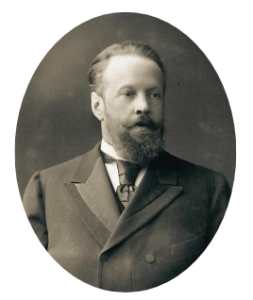
Sergei Witte.
“As I am many years her junior, I do not have any recollections of Elena in her youth. From the stories current in our family, I gather that when her mother died, she and Vera Petrovna came to live with my grandfather at Tiflis. At an early age such is the family tradition, Elena married a certain Blavatsky, a Vice Governor of the province of Erivan, and settled in the city of the same name. She soon abandoned her husband and came back to her grandfather. When she appeared in his spacious mansion, he immediately decided to send away the troublesome young person at the earliest possible moment to her father, who was an artillery colonel stationed in the vicinity of St. Petersburg. As there were at that time no railways within the territory of the Caucasus, the problem was not without its difficulties. It was solved in this wise. Two women and as many men, including grandfather’s trusty steward, were selected from the large staff of domestic serfs, and under this convoy the Elena proceeded in the direction of Poti, enthroned in a capacious four-in-hand. From Poti it was planned to ship the fugitive by sea to some port connected by rail with the interior of Russia. When the company arrived in Poti, several steamers, including an English craft, lay in the harbor. Young Elena, so the story runs, immediately struck up an acquaintance with the captain of the English vessel. To make a long story short, one fine morning the convoy discovered, to their horror, that their mistress and charge had vanished into the air. Stowed away in an English ship, she was on her way to Constantinople.
“At Constantinople she entered a circus as an equestrienne, and it was there that [Abram] Matveyevich [Abramov,] one of the most celebrated opera bassos of the time, fell in love with her.[7] She gave up the circus and accompanied the singer to one of the European capitals where he was engaged to sing. Shortly afterwards, grandfather was the recipient of letters from the singer Matveyevich, who asserted that he had been married to Elena and styled himself ‘grandson.’ The famous basso apparently was not disconcerted by the fact that she had not been properly divorced from her legal husband, the Vice-Governor of Erivan. Several years later a new ‘grandson’ accrued to my grandparents. A certain Englishman from London informed them in a letter bearing an American stamp that he had been married to Elena, who had gone with him on a business trip to the United States. Next, she reappears in Europe, and becomes the right hand of the celebrated medium of the sixties, Hume. Then her family caught two more glimpses of her dazzling career. They learned from the papers that she gave pianoforte concerts in London and Paris, and afterwards became the manager of the royal choir maintained by King Milan of Serbia.
“In the meantime, some ten years had passed. Grown tired, perhaps of her adventures, the strayed sheep decided to return to the fold. Elena succeeded at the end of that period, in getting grandfather’s permission to return to Tiflis. She promised to mend her ways and even go back to her legitimate husband. It was during that visit of hers that I saw her first. At that time, she was but a ruin of her former self. Her face, apparently once of great beauty, bore all the traces of a tempestuous and passionate life, and her form was marred by an early obesity. Besides, she paid but scant attention to her appearance and preferred loose morning dresses to more elaborate apparel. But her enormous, azure-colored eyes were extraordinary. When she speaks with animation, they sparkle in a fashion which is altogether indescribable. Never in my life have I seen anything like that pair of eyes!”
Charley nodded in agreement.
“It was this apparently unattractive woman that turned the heads of a great many society people at Tiflis,” Witte continued. “She did it by means of spiritualistic séances which she conducted in our house. Every evening, I remember, the Tiflis society folks would foregather in our house around Elena Petrovna. Among the guests were Count Vorontzov-Dashkov, the two Counts Orlov-Davydov and other representatives of the jeunesse dorée, which at that time was flocking to the Caucasus from the two capitals in quest of pleasure and adventure. The séance would last the whole evening and oftentimes the whole night. My cousin did not confine the demonstrations of her powers to table rapping, evocation of spirits and similar mediumistic hocus-pocus. On one occasion she caused a closed piano in an adjacent room to emit sounds as if invisible hands were playing upon it. This was done in my presence at the instance of one of the guests. Although a young boy, my attitude toward these performances was decidedly critical and I looked on them as mere sleight of hand tricks.”
“And the rest of the family,” asked Charley, “what did they think?”
“These séances were kept secret from my grandparents, and my father entertained a negative attitude towards the whole business. It was Hume, I believe, to whom Elena owed her occult knowledge.”
Charley was skeptical of Witte’s claim but continued listening without interruption.
“Elena made her peace with her husband and went as far as establishing a home at Tiflis, but it was not given to her to walk the path of righteousness for any length of time. One fine morning she was accosted in the street by Matveyevich. The famous basso was now declining, artistically and otherwise. After a brilliant career in Europe, he was forced to accept an engagement at the Italian Opera of Tiflis. The singer apparently had no doubts as to his rights to my cousin and did not hesitate to assert his claims. As a result of the scandal, Elena vanished from Tiflis and the basso with her. The couple went to Kiev, where under the guidance of his ‘wife’ Matveyevich, who by this time was approaching sixty, learned how to sing in Russian and appeared with success in such Russian operas as ‘Life for the Czar,’ ‘Rusalka,’ etc. The office of Governor-General of Kiev was held at that time by Prince [Aleksandr Mikhailovich] Dondukov-Korsakov. The Prince, who at one time served in the Caucasus, had known Elena in her maiden days. I am not in a position to say what was the nature of their relationship, but one fine morning the Kievans discovered a leaflet pasted on the doors and telegraph posts which contained a number of poems very disagreeable for the Governor-General. The author of this poetic outburst was none other than Elena herself, and as the fact was patent the couple had to clear out.

Kiev Opera House.
“She was heard of next from Odessa, where she emerged in the company of her faithful basso. At the time our entire family was settled in that city—my grandparents and father had died at Tiflis—and my brother and I attended the university there. The extraordinary couple must have found themselves in great straits. It was then that my versatile cousin opened in succession an ink factory and retail shop and a store of artificial flowers. In those days she often came to see my mother and I visited her store several times, so that I had the opportunity of getting better acquainted with her. I am still especially impressed by the extraordinary facility with which she acquires skill and knowledge of the most varied description. Her abilities in this respect verge on the uncanny. A self-taught musician, Elena was able to give pianoforte concerts in London and Paris, and although entirely ignorant of the theory of music, she conducted a large orchestra. Consider also that although she never seriously studied any foreign languages, she spoke several of them with perfect ease. I am also struck by her mastery of the technique of verse. She can write pages of smoothly flowing verse without the slightest effort, and she could compose essays in prose on every conceivable subject. She has, no doubt, a literary talent. The Moscow editor, Katkov, famous in the annals of Russian journalism, speaks to me in the highest terms of praise about her literary gifts—as evidenced in the From the Jungles of Hindustan which she contributed to his magazine The Russian Messenger (Russki Vyestnik.)
“Aunt Lelya suggested I translate this,” said Verochka.
Charley smiled with pride.
“Elena’s ventures in the field of commerce and industry proved, of course, dismal failures,” continued Witte. “It was then that Matveyevich accepted an engagement to sing at the Italian Opera at Cairo and the couple set out for Egypt. By that time, they presented a rather sorry sight, he a toothless lion, perennially at the feet of his mistress, an aged lady, stout and slovenly. Off the African coast their ship was wrecked, and all the passengers found themselves in the waves. Matveyevich saved his mistress but was drowned himself. Elena entered Cairo in a wet skirt and without a penny to her name. How she extricated herself from that situation, I do not know.
“She houses a spirit which is, no doubt, independent of physical or physiological being. As to the particular realm of the invisible world from which that spirit emerges, there may be some doubt whether it is Inferno, Purgatory or Paradise. I cannot help feeling that there is something demonic in this extraordinary woman.”[8]
“Witte has quite exceptional ability,” thought Charley, “but the cardinal defect of his character is that he distrusts everyone, and is, as a consequence, trusted by no one. To those who knew of Blavatsky’s integrity, her travelling in company with men was wholly natural. But it is not difficult to see how an unclean imagination might color and distort situations that were unconventional, yet wholly blameless.” Charley regretted feeling “that the life and character of Count Witte were not such as to make him a fair interpreter.”[9]
~
Toward the end of the evening Charley received a telegram. It was from Ballykilbeg. Ina Johnston, Charley’s three-year-old sister, had died.[10]
← →
THE AGONISED WOMB OF CONSCIOUSNESS SECTIONS:
INTRO: CHARLEY.
I. WITCH TALES.
II. CARELESS WHENCE COMES YOUR GOLD.
III. THE TIMES ARE CHANGED.
IV. DENIZEN OF ETERNITY.
V. DOMOVOY.
VI. WITH LOW AND NEVER LIFTED HEAD.
VII. IMPERIAL GOTHIC.
VIII. THE SERVANT OF THE QUEEN.
IX. THE DWELLER ON THE THRESHOLD.
X. INDO-GOTHIC YOGA.
XI. INTENDED FROM ABOVE.
XII. THE SÉANCE ON CHEYNE ROW.
XIII. EVEN IN NEW ROOMS.
XIV. RUSSIA’S LEGENDARY LORE.
[APPENDICES]
SOURCES:
[1] Zhelikhovskaya, Vera Petrovna. V. P. Zhelikhovskaya Letters (1878-1896) Bakhmut Roerich Society, n.d.
[2] Radulovic, Nemanja. “Slavia Esoterica Between East and West.” Ricerche Slavistiche. Vol. XIII, No. 59. (2015): 73-102.
[3] Johnston, Charles. “Russia’s Legendary Lore.” The Calcutta Review. Vol. XCIV, No. 187 (January 1892): 1-25.
[4] Note 33. Zhelikhovskaya, Vera Petrovna. V. P. Zhelikhovskaya Letters (1878-1896) Bakhmut Roerich Society, n.d. https://art-roerich.org.ua/sites/default/files/blavatska/V.P.Jelihovski_Letters17.pdf.
[5] Note 62. Zhelikhovskaya, Vera Petrovna. V. P. Zhelikhovskaya Letters (1878-1896) Bakhmut Roerich Society, n.d. https://art-roerich.org.ua/sites/default/files/blavatska/V.P.Jelihovski_Letters17.pdf
[6] Johnston, Charles. “Serge Iulitch Witte.” The North American Review. Vol. CVIII, No. 586. (September 1905): 435- 447.
[7] Witte states: “The couple went to Kiev, where under the guidance of his ‘wife’ Mitrovich, who by this time was approaching sixty, learned how to sing in Russian and appeared with success in such Russian operas as ‘Life for the Czar,’ ‘Rusalka,’ etc. The office of Governor-General of Kiev was held at that time by Prince Dundukov Korsakov.” [Witte, Sergei Yulyevich; Yarmolinksy, Abraham (Translator) The Memoir Of Count Witte. Doubleday, Page & Company. Garden City, New York. (1921): 8-9.] Knowing that Aleksandr Mikhailovich Dondukov-Korsakov was governor-general of Kiev, from 1869 to 1876, we can focus on those years for clues to “Mitrovich’s” true identity. The “Russian Opera” opened in Kiev on October 27, 1867. Mikhail Glinka’s A Life for the Tsar opened on December 18, 1867, and Aleksandr Dargomyzhsky’s Rusalka opened on December 18, 1868. [Sereda, Ostap. “Nationalizing or Entertaining: Public Discourse on Musical Theater in Russian-ruled Kyiv in the 1870s and 1880s.” Chapter in Oper im Wandel der Gesellschaft. [editors: Müller, Sven Oliver; Ther, Philipp; Toelle, Jutta; zur Nieden, Gesa.] Kulturtransfers Und Netzwerke Des Musiktheaters Im Modernen Europa. (2010): 31–56. doi:10.7767/BOEHLAU.9783205790488.31.] It would seem, therefore, Abram Matveyevich Abramov, not “[Agardi] Mitrovich,” would be the true name. According to the Encyclopedia of Russian Jewry: “Abram, (original name: Pasternak) Abram, Matveyevich (?-?), bass opera singer. Having studied in Moscow, he made his debut at the Kiev Opera and sang as a Bolshoi Opera soloist (from 1876 to 1882.) He appeared as Susanin in Glinka’s Life for the Tsar. He was a soloist of the Mariinksy Opera in 1882 and first appeared as Ramses in Verdi in Aida. Touring internationally, he sang the parts of the Demon in Rubenstein’s The Demon, Eliakim in Holofernes in Serov’s Judith, and the Cardinal in Halevy’s La Juive.” [ Branover, Herman. [ed.] The Encyclopedia of Russian Jewry: Biographies A-I. Jason Aronson Inc. Northvale, New Jersey. (1998): 4.]
[8] Witte, Sergei Yulyevich; Yarmolinksy, Abraham (Translator) The Memoir Of Count Witte. Doubleday, Page & Company. Garden City, New York. (1921): 4-10.
[9] E.T.H. “On The Screen Of Time.” The Theosophical Quarterly. Vol. XXVII, No. 3. (January 1930): 286-297.
[10] On September 26, Ina Johnston died at 131 Leinister Road, Dublin. 3 years and 7 months. [“Deaths.” The Belfast News-Letter. (Belfast, Ireland) September 28, 1888.]


